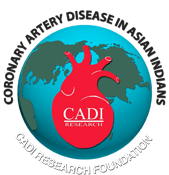CT Angiogram─ Think Again
- Thousands of coronary computed tomographic angiograms (CCTA) are done everyday to identify coronary artery disease (CAD) in low-risk patients who may not really need it.
- A recent study found that CCTA resulted in a 10-fold increase in the use of coronary angiogram, angioplasty, stent, and bypass surgery with no decrease in heart attacks over a period of 18 months.1
- The investigators studied asymptomatic patients from a health-screening program. The study population was comprised of 1,000 patients who underwent CCTA as part of a prior study, and a matched control group of 1,000 patients who did not. A total of 215 patients in the CCTA group had coronary atherosclerosis (22%).
- An abnormal CCTA result was associated with a 3- to 4-fold higher use of aspirin and statin prescriptions, at 3 and 18 months which lessened with time. Performance of CCTA was also associated with significantly more secondary testing (2-fold) and coronary angioplasty, stent, and bypass surgery (10-fold) although none of them had any symptoms. Only one cardiovascular event occurred in each group over 18 months. Thus CCTA screening was associated with a substantial increase in downstream cost from invasive testing and procedures without any cardiovascular benefits as described below.1
- A 52-year-old low-risk female nurse presented to a community hospital with atypical chest pain. Her LDL-C (low-density lipoprotein cholesterol) and high-sensitivity C-reactive protein levels were not elevated. She underwent CCTA, which showed both calcified and noncalcified coronary plaques in several locations. Her physicians subsequently performed coronary angiography, which was complicated by dissection of the left main coronary artery, requiring emergency coronary artery bypass graft (CABG) surgery.
- Patient stayed in the hospital for two weeks with a residual left ventricular ejection fraction of 35%. The bypass graft soon failed and was treated with multiple drug-eluting stents, but despite her compliance with dual antiplatelet medical therapy, a stent in the vein graft supplying one of the arteries (the circumflex artery) developed a blood clot, causing an ST-segment-elevation myocardial infarction (massive heart attack) complicated by cardiogenic shock.
- The blood clot was successfully treated, but the patient remained in refractory cardiogenic shock and ultimately underwent heart transplantation.2
- This case illustrates the hazards of the inappropriate use of CCTA in low-risk patients and emphasizes the need to temper the enthusiasm in applying this new technology to the evaluation of patients with atypical chest pain.2
Sources
1. McEvoy JW, Blaha MJ, Nasir K, et al. Impact of Coronary Computed Tomographic Angiography Results on Patient and Physician Behavior in a Low-Risk Population. Arch Intern Med. May 23 2011.
2. Becker M.C, Galla JM, Nissen SE. Left Main Trunk Coronary Artery Dissection as a Consequence of Inaccurate Coronary Computed Tomographic Angiography. Arch Intern Med. Dec 13 2010.

